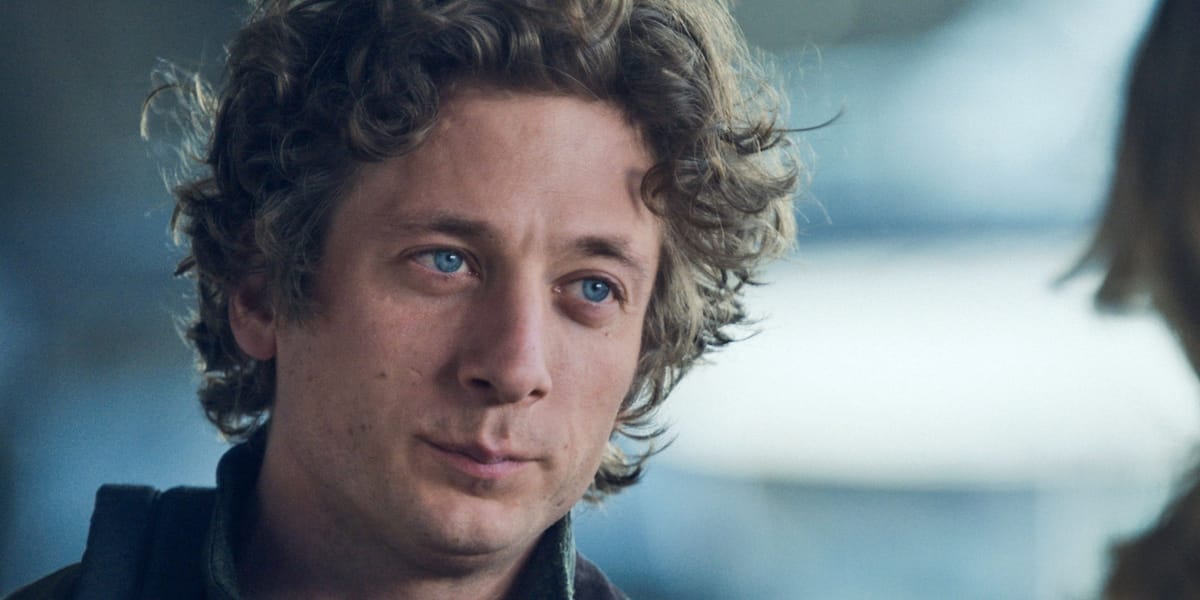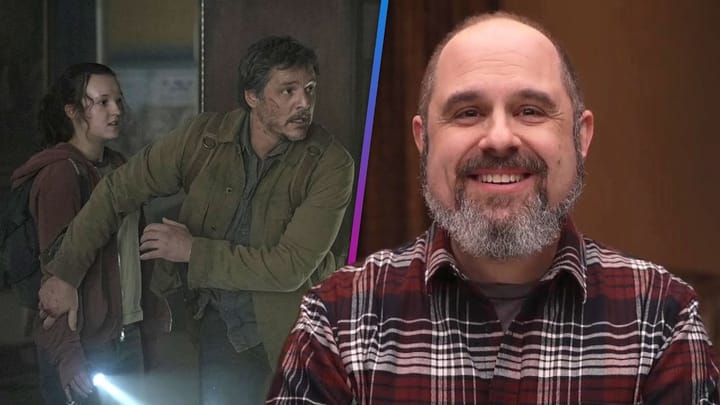The Bear is a Bear
The Bear is one of those shows that has mastered the dramatic tool of tension. On the premier episode of season 3, "Tomorrow",hey inverted that tension, employing a new tool that still fits with the show’s ethos.

Season 3 Premiere is a stunning work of art
Open
We have plenty of TV shows to watch that have for over a decade made us all savants of storytelling and the techniques that engage us. The audience is at its master’s degree level, deciphering not just the story’s context, but also how it’s being crafted.
Writers are constantly having to evolve the craft and medium to engage viewers in new and subtle ways. One of those tried and true tactics that hooks viewers is tension. Tension is a magical tool to make people feel without talking or explaining. Noah Hawley by way of Fargo is, in my option, the Grandmaster of this tool. But it’s not easy. It takes a delicate touch and foresight that is difficult to pull off.
The Bear is another one of those shows that has mastered this dramatic layer. Out of the gate from the first season of the first episode, in the first scene, the tension was palpable. It grabbed you. It stressed you out. It was unlike anything I’ve experienced on TV before. It became the calling card of the series. We tuned in to stress watch.
That all changed for the season three premiere “Tomorrow”. In the premier episode of the new season, they inverted that tension, employing a new tool that still fits with the show’s ethos.
Watching the premiere, I welled up with emotion— as I have with several other The Bear episodes— with the big difference in that it didn’t stop slowly progressing from the beginning till the end. It felt like I was slowly having my heart squeezed tighter and tighter every minute. Counter to the in your face intensity of restaurant kitchen madness, that is a staple of the show, here they methodically built the tension as if boiling you in a slow cooker.
Looking deeper, while the episode had the trademark visceral tension, it was remarkable in how it created that tension. By breaking the narrative into a half-dozen or so vignettes showing the moments before and after the rush, it focused on the details and dedication that elevate the craft. It was subtle. It was deeper. It was remarkably effective.
I sat there watching, slowly understanding the cadence after several minutes. The repetition. The grind. The love. The process. But the key is, they don’t let up. The normal narrative never showed up. It was breathtaking and heart-pounding. It had me on the verge of tears the entire time.
This intentional shift in the narrative’s cadence I think is a master stroke because it reorients and resets the viewer’s focus to the show's ideas and intentions and less on the melodrama of its characters.
This show deftly continues to showcase its two main themes— finding your place in the world and the toll of perfection.
That is what I find so evocative about this show. How deep they are examining the pursuit of a craft’s essence—what that takes, what that means, along with the toll and ripple effects that have on a person (and inversely what an escape it can be from all the noise).
This show is set in the world of haute cuisine. But it could be set in any world of skill and artistry. I innately and immediately superimpose a proxy of screenwriting onto it. And it crushes me. From the ache to achieve, the courage to engage, the necessary sacrifice, the endless struggle.
Watching the show demonstrate the grind to mastery in the world of culinary upper echelons has always been ever present, but never so forthright as in this episode. And maybe that’s why it home so hard. My appreciation and fear of giving your all consuming attention to what your passionate about while also searching for a way to battle ridicule and challenges to stay true to you.
This is what sets this show apart, though. Its ability, and seeming intention, to have the audience superimpose their life correlation to the events on screen is incredibly powerful. It’s the ultimate drive and purpose of any show— to connect.
But what took that connection to gut punch level, was when they presented the theme of the season…
Subtract.
It’s a bit unique to hang a lantern on your season theme the way the show does, but to have one that is so clear and correlative to the audience while eminently relevant to the narrative arc, was a wonderful bit of alchemy.
Whether related to your profession— all writers are taught to cut— or general life, we can all do with less.
How this is laid out is the crusher, though. For the past two seasons, we’ve seen flashbacks to Carmy’s culinary education through different kitchens, but most notably on an unnamed chef (played by the versatile Joel McHale) who has the distinct honor of terrible human. Assumed to be the executive chef at a high-end restaurant in New York, he constantly berates and demeans Carmy— his ability, his effectiveness, his dishes, and tastes.
In this episode, we get the most revealing look into that relationship, showing the lasting effect it’s had on Bear. But in a remarkable turn we see a glimpse of reciprocal exchange of knowledge, though in the most brutal way possible.
This unnamed chef doesn’t just tell Carmy to subtract, he writes it in a stripe of the ubiquitous green tape, cuts it, and adheres it to his station. Then he proceeds to change Bear’s dish by removing multiple ingredients and adding one back. In one last embarrassing moment, to further assert the chef’s dominance, he claims the dish as his own.
It’s a crushing moment. One the Carmy must accept, even through gritted teeth. But the lesson is true. True in cooking, true in writing, true in life.
Remove what is unnecessary.
This effect Carmy in everything he does since we met him and how he sees the world. It affects how he cooks, how he lives, and how he builds relationships.
This hits home so much as a writer as well. It’s what you are taught, what you are ingrained with, it’s what you know is true even if you hate it. For me, it was one of those moments when a show is hitting all the right beats then grabs you with something so personal to you, it’s like they read your mind. You are not alone and so excited to see where they take it.
But my appreciation for this episode (and the show as a whole) is not just the deep layered context that personally touched me, but in its execution to convey it.
This episode is a stunning piece of scripted narrative in any medium.
It earns this praise for both its work in narrative and character building of the first two seasons, but also for its ability to stand on its own without any context of prior seasons.
As a thought exercise, contemplate this episode being the pilot of the series— that this is when we start the story. It works, abet with a different perspective. That is so remarkable.
But I think having this episode at this time in the series is one of those moments in a story that synthesizes what the story arc is aiming to do. It laid the groundwork in earlier seasons, with a bigger picture now taking shape.
This picture is about the pursuit of doing something, ostensively bigger and better than yourself, and its cascading effects— relationships, physical and mental wellbeing, your dent in the universe.
But why I feel I’m reacting strongly to this episode is because it caught me off guard. While I knew the show’s cadence, it was still an unknown of what would happen next after the events of the season two finale. But I felt ready. Ready for the story’s next day, next week, next month from wherever they picked up the story. What it did was smash those expectations by modifying its storytelling framework.
Earlier, I mentioned the using a different type of tension to steer the audience back to the themes of the show rather than the character’s interpersonal relationships. This helps lower the stakes of the narrative, to matter less about what happens in the world’s story or even its protagonist. From that we gain something more, something better— a deeper connection.
We associate more with the idea of the show, what it’s speaking too and how it transverses to our lives.
At the heart of it, the characters are all trying to find their place in this world, all questioning where they are, where they’ve been, and what it means to where they will go. It’s not an uncommon theme in film and TV, but The Bear continues to defy expectations, going past the narrative drama, using it to drill down into something deeper, more primal, more communal. Like the instincts of a bear.
Post Script: Score
One other area that needs to be applauded is the show’s use of music. It continues an impeccable run of tonally resonate music selection. This entire episode is mostly accompanied by the Nine Inch Nails song, Together with a haunting effectiveness.
But it's not an outlier.
The first two seasons are a playlist of subtly great music that sets and fits the tone of the show. This isn’t accidental or luck, either. Creator Chris Stover has a background in music and music videos, while clearly a personal love of his. He may or may not pick all the music in the show, but clearly has the right team and influence to match his vision for the feel of the show. I love digging into the back catalog of both new and classic artists. To hear under recognized songs and musicians contributions to the tone and energy of the show, elevates engagement and connection.





Comments ()